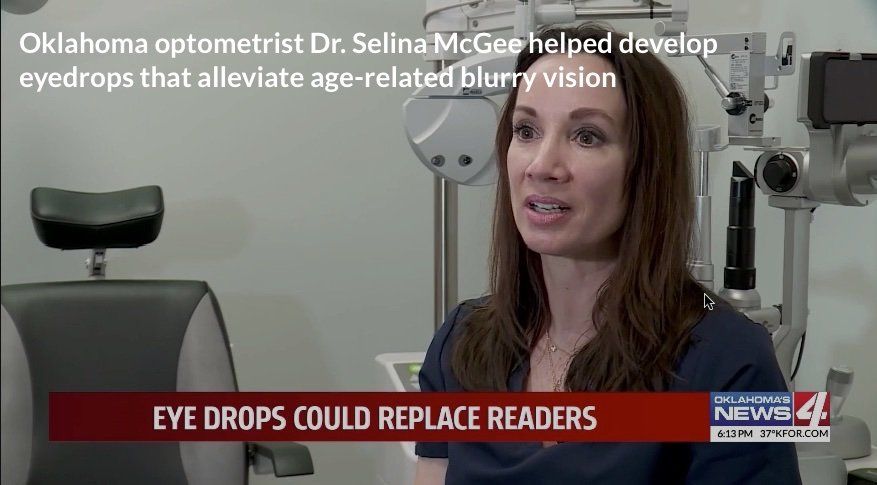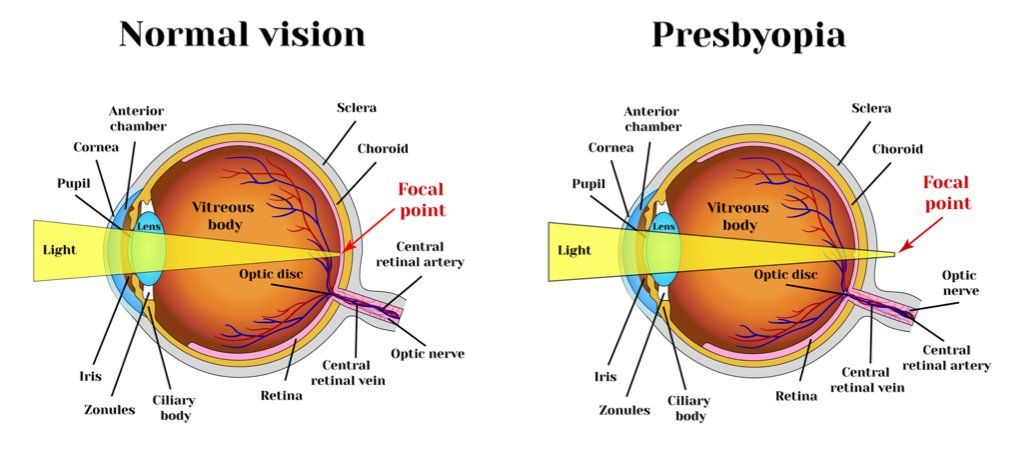FRUSTRATED TRYING TO FIND YOUR READING GLASSES?

Imagine using a drop to achieve comfortable near vision!! And no more readers.
It's here - Vuity is the first in class drop approved by the FDA for blurry near vision.
Schedule an appointment with Dr. McGee or Dr. Cherian to see if Vuity is right for you.
Skip the pharmacy, Vuity is now available to purchase in our office.
HOW YOUR VISION CHANGES AFTER AGE 40
If reading has become more difficult with more birthdays, you might have presbyopia.
WHAT IS PRESBYOPIA?
Presbyopia, also known as age-related farsightedness, is common in middle age and usually leads to changes in vision after the age of 40. Unlike hyperopia or farsightedness, which is related to the shape of the eye, presbyopia is a natural part of aging.
Presbyopia has also been called “long-arm sight” because people tend to stretch their arms as far as possible to read.
Once presbyopia starts, it is progressive.
PRESBYOPIA SYMPTOMS
- Blurred vision at a normal reading distance
- Headaches or eye strain when doing things that require near vision
- Having difficulty reading small print
- Needing brighter lighting when reading or doing close work
- Needing to hold reading material at an arm's distance to focus properly on it
- Squinting to see clearly
Schedule an eye exam
WHAT CAUSES PRESBYOPIA?
Presbyopia is an age-related process. Aging affects all parts of the body, including the eyes.
As the lens in the eye ages, it hardens and becomes less flexible.
Age related changes also affect the muscles surrounding the lens.
With decreased flexibility of the lens, it becomes difficult to view things clearly when they are up close.
Unfortunately, presbyopia cannot be prevented or treated by diet or lifestyle changes.
TREATING PRESBYOPIA
One of the most common ways of treating presbyopia is with reading glasses. At first, these may not have to be prescription strength, and you may only need these "readers" for certain tasks.
Other Treatment options include:
Prescription eyedrops
In late 2021 the FDA approved the first-ever eyedrop called Vuity™️ for treating patients with age-related blurry vision aka presbyopia. In clinical trials, Vuity™️ improved both near and intermediate vision without affecting distance vision. BeSpoke Vision is the first eye clinic in Oklahoma to offer this groundbreaking treatment option for patients. Contact us today to learn more or schedule an appointment to meet with one of our eye doctors to determine if Vuity™️ is right for you.
Prescription eyeglasses
- Bifocals work for many people with presbyopia. Bifocals are eyeglasses with two different prescriptions in one lens. The top part corrects for distance vision. The lower section helps you see objects up close.
- Progressive lenses have three prescriptions in one pair of glasses. That allows you to see up close, in the middle distance and at long distances without needing to change your glasses. They're sometimes called multifocal lenses.
Contact Lenses
Contact lenses can be used for a glasses-free approach. Options for treating presbyopia include:
- Multifocal lenses - These lenses have either a bifocal design with two distinct lens powers or a multifocal design similar to progressive eyeglass lenses.
- Monovision lenses - One lens helps you see objects at a distance. The other is for close-up vision.
Refractive eye surgery
If you have never worn glasses or contacts, the prospect of needing readers or contacts to see close objects may be unappealing.
Some people work in professions where contact lenses aren’t feasible due to environmental conditions. Others aren’t able to wear glasses due to the nature of their occupation. Some examples may include firefighters, lifeguards, photographers and construction workers.
Whether comfort or occupation are a barrier to wearing contact or glasses to correct for presbyopia, there are surgical options available which include:
- Corneal Inlay
- Monovision LASIK
- Refractive lens replacement
Over 110 million Americans have presbyopia and the number will continue to grow as younger generations age into their 40’s. As a result, the healthcare community continues to research and develop new methods for treating presbyopia.
As an example, several pharmaceutical companies have trials underway to test the use of a daily eye drop to control presbyopia.
Dr. McGee recently joined the faculty of the Oklahoma Medical Research Foundation and actively participates in conferences and discussions related to advancements in treatment options for eye conditions like presbyopia.
DO YOU HAVE PRESBYOPIA?
While there are some exceptions, the vast majority of Americans will experience some degree of presbyopia as they age. If you are finding it more difficult to read or perform up close work, your best option is to
schedule an appointment with Dr. McGee. She will perform a comprehensive eye exam and will help you understand all of your options for clearer vision.
WHAT OUR PATIENTS SAY
"I always love the smiling faces and friendliness of all of the staff every visit! I love the information I'm able to receive from all staff, not just the doctor!
Brittany P.
“Needed help right away. Got in quickly. Had been to med clinic twice without much help, but BeSpoke figured it out and has me on the mend.”
James R.
“I can't thank you enough for taking such good care of my eyes. Always a pleasure to come to an appointment and I'm glad to see the most up-to-date equipment! Keep doing what you're doing.”
Jeffrey M.
“Very professional but friendly, punctual, and everyone can answer all my questions. I’ve had great results with a long drawn out problem before coming. Dr. McGee has been an answer to a prayer.”





